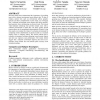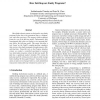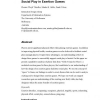26354 search results - page 94 / 5271 » How we refactor, and how we know it |
AVI
2008
14 years 15 days ago
2008
Previous studies have demonstrated the importance of providing users with a coherent environment across distant sites. To date, it remains unclear how such an environment affects ...
FTCS
1998
13 years 11 months ago
1998
Most fault-tolerant systems are designed to stop faulty programs before they write permanent data or communicate with other processes. This property (halt-on-failure) forms the co...
PUC
2010
13 years 5 months ago
2010
Players invest significant physical effort when playing exertion games. In addition to improving physical health, exertion games are also believed to facilitate social play amongs...
CHB
2011
13 years 1 months ago
2011
Admittedly this is a presumptuous title that should never be used when reporting on individual research advances. Wisdom is just not a scientific concept. In this case, though, w...
ICONFERENCE
2012
12 years 5 months ago
2012
As Facebook has become global, users from different cultural and socio-political contexts have joined the site. We present a case study investigating how both current and historic...



